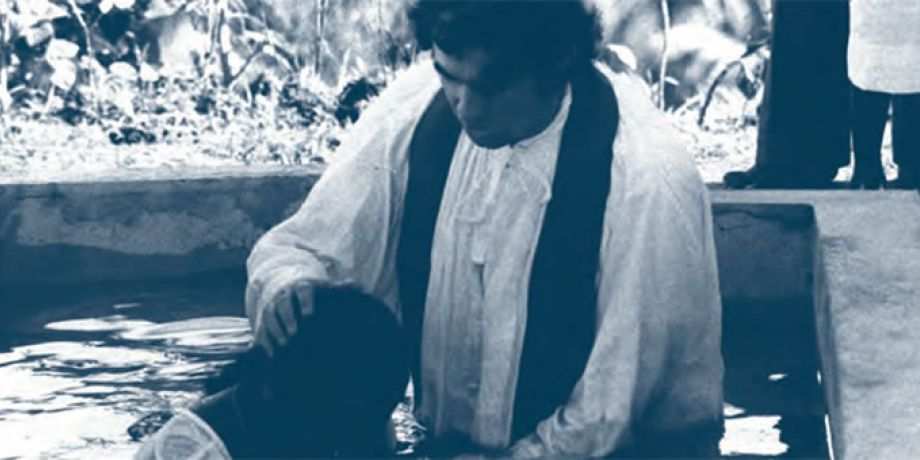
RCIA (Rite of Christian Initiation of Adults)
Previous Practice
Seventy years ago, if a person wanted to become a Catholic they attended “convert classes.” A priest usually gave weekly talks on the important Catholic dogmas and the Sacraments of the Church. Then the “converts” would be baptized, perhaps on a Sunday or perhaps not. The baptism would usually be celebrated separately from Mass. The person would receive first communion some time later and be confirmed with school children when next the bishop came to the parish.
What was the thinking behind this practice? Firstly, intellectual knowledge of the faith was emphasized. Secondly, only the priest could be trusted to teach correctly the faith of the Church. Thirdly, the involvement of the community (parishioners) was not important. Fourthly, adult baptism was unconnected to the Eucharist and to the liturgical seasons.
Change
The second Vatican Council introduced new theology and pastoral changes. The Constitution on the Sacred Liturgy revived the adult catechumenate, a practice of the early Church. A number of liturgical rituals were to be included at various times during the catechumenate. The Rite of Christian Initiation of Adults (RCIA) was made available throughout the Church in 1972. The word “convert” is now applied to us all because we all need renewed conversion.
Now, seekers are introduced to the catechumenate group by friends. A team of lay people, supported by a priest, animates or facilitates weekly sessions of the catechumenate for at least one year. They use an adult education method – beginning with a life experience and helping the seekers to share their ideas or experiences. Well-chosen Scripture passages enlighten and deepen the experiences. Ordinary life applications are made. The seekers try to live out their insights during the following week.
A Community
The initial sessions are on important human issues like listening, values, feelings, inner healing and childhood. Assured of confidentiality, the seekers begin to share about themselves. Then the animators present the key aspects of the Christian faith e.g. experience of God in life and culture, God’s plan for us, the power of the Cross, the Resurrection, and God’s call. At this point, the seekers formally commit themselves by a public ritual, the Entry to the Catechumenate, at a Sunday Mass. Good Catholics become sponsors to each catechumen and accompany them thereafter on their journey of faith.
The weekly sessions continue. The catechumens are introduced to small Christian communities (SCC) and participate in Church activities and ministries. On the first Sunday of Lent, the bishop gathers the catechumens from different parishes in the Cathedral for the Rite of Election. God-parents or sponsors witness that the catechumens have shown commitment and grown in faith. The names of the catechumens are written in a book, signifying that they have been accepted for initiation at Easter.
Initiation
The period of purification during Lent is an intense period of prayer and conversion for the elect. On three Sundays of Lent, special Gospels are read, and they receive special blessings. The Our Father and the Creed are presented to them on weekdays of Lent. The parishioners pray for them and encourage them.
At the Easter Vigil, after the ceremonies of the fire and light and the extended liturgy of the Word, the bishop or parish priest baptizes the elect, by immersion if possible or else by sprinkling water on their heads. Afterwards they are clothed in white clothes and hold a lighted candle. The bishop (or the parish priest) then confirms them with the oil of chrism. The newly baptized bring up the offertory gifts and are first to receive the Eucharist – under the forms of both bread and wine. Thus they are fully initiated through the Sacraments of Baptism, Confirmation and the Eucharist.
The newly baptized continue to meet with their animators to learn more about the Church’s Sacraments until Pentecost. They usually make their first confession before the feast. From that point forward, they continue to grow spiritually through prayer, Eucharist and participating in their SCCs.
A Community-centered RCIA
The whole Christian community participates in the faith journey of the catechumens. The support of the priest is very important. Sponsors or godparents are essential to explain many details of Catholic life and practice. SCC members pray, share with and advise the catechumens. Other Catholics welcome the seekers and give them an example of the Christian life of prayer and service.
Of course this ideal program has to be modified at times. An adapted catechesis is used for children between the age of 7 and 14. If there is only one catechumen, the community element of the process can be preserved by the participation of godparents and animator. If someone is in danger of dying, a shortened catechesis is employed before initiation which could, if necessary, be held on a week day in the person’s home or in hospital.
Catechumens and Candidates
Other Christians who wish to join the Catholic Church are not called catechumens because they have already received baptism, and baptism is not repeated. They are called “candidates,” and they prepare for the Sacraments of Confirmation and Eucharist. These are best received, not during the Easter Vigil so as not to confuse them with those elected for baptism, but on a Sunday during the Easter season. The culture and mind set of catechumens and candidates are very different, and a different catechesis for each is needed. Therefore animators should be representative of the different catechumen cultures.
The RCIA is an essential pastoral process of every parish. It is one important way of being a missionary Church.
Columban Fr. Frank Hoare lives and works in Fiji.